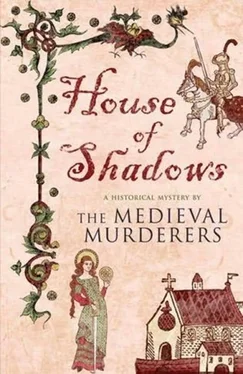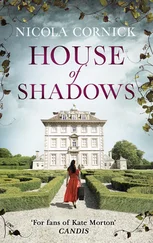‘Brother James? I have not met him but his name is familiar.’
‘No more have I met him, Master Chaucer, since Brother James has been dead two centuries and more. He was buried down there in the vault all those years ago. I had no idea he was there when I gave orders for the stonework to be made good. The masons discovered some bones when they went to repair the recesses in the wall. There were bones and a skull together with fragments of monkish garb, and evidently this ring, which I have not seen before. The Morton brothers must have kept it back. It doesn’t matter now. The remains didn’t matter either. They were what you might expect to uncover in any holy site which is old and which has lain undisturbed for centuries. I gave instructions that the bones and cloth fragments were to be resealed in the wall. What mattered was the testament which was found with the bones. From the seal and the signature we knew that it belonged to Brother James.’
‘He died violently?’
‘I do not believe so. There were no marks of violence on the skull or other remains. And, in fact, his testament shows that he was expecting to die a natural death very shortly after he wrote it. He was more than seventy years old.’
Geoffrey suddenly recalled where he had heard the name of Brother James before. He was one of the monks who’d been walking on the banks of the river and witnessed the miraculous appearance of the Bermondsey cross, dropped from the beak of a giant and mysterious bird. Hadn’t the prior, Richard Dunton, mentioned an account or testament that Brother James had left? Was it this, or a copy of it, to which Michael was referring?
‘The masons informed me of their discovery, as was their duty. But they held back two items. This ring, it seems. And the document. No doubt they were wondering how to profit by it.’
‘The document was in Latin, surely?’ said Geoffrey. ‘How could they know its contents. They would not have been able to read.’
‘You are right, more or less. One of them, Simon, could read a little but only words in English. Somehow, though, the two men had got hold of the idea that Brother James’s testament contained matter that was both valuable and dangerous. A day or two after the discovery of the bones, they came to tell me what else they’d found, half in the spirit of discovery, half in the desire to see what they could gain by it. They did not produce the document but merely hinted at what it contained. I told them it was all nonsense, that they should at once hand over what they’d found. It was the property of the priory. I think that Simon Morton might have been persuaded. He already looked sick and feverish and he said the vault was a cursed place. But John Morton wasn’t so easily swayed. He is an outsider from Chatham way. “What’s in it for us?” he kept on saying. So in the end I agreed to give them something in exchange for the testament.’
‘You gave them money?’
‘Yes. I met them in the lay cemetery. They had visited this office once too often, and I preferred to see them outside the priory. Simon Morton looked sicker than ever. I don’t think he came back to work after that. Much good the discovery did him or his brother, and now they will both finish in the place where we met.’
‘You have the parchment still?’ asked Geoffrey, glancing at the pile of papers on Michael’s desk.
‘It is destroyed. I burned it on instructions from the prior. But I would have burned it anyway without his say-so.’
‘Whatever it contained must have been…“dangerous” was your word.’
‘It was dangerous, in its way. I do not mind telling you, Geoffrey, as a man of the world. But I would be obliged if you did not spread the story abroad. If you did, then it would be denied by us.’
‘Us?’
‘The Cluniacs of Bermondsey, the few who know what was contained in Brother James’s testament.’
‘As long as it is nothing seditious or connected to wrongdoing, I’ll keep quiet,’ said Chaucer. ‘And since the man who wrote it is long dead, I don’t see how his words can be seditious or criminal.’
‘They were not. Rather they were righting an old wrong – as Brother James saw it.’
‘Where is the harm, then?’
‘You’ve been to Winchester, Geoffrey? You have seen the great table which is in the castle there?’
Geoffrey shook his head, but he understood what the monk meant by the Winchester great table. It was reputed to be the very board at which King Arthur and his knights had sat in the ancient days of romance and chivalry, a table that was circular so that none of those sitting at it would be able to claim precedence over the others. However, he wondered what Brother Michael meant by raising the subject.
‘The round table is supposed to be many hundreds of years old,’ the monk continued. ‘Supposed by the ignorant, that is. But I have heard that it was made much more recently and that our present king, Edward, is glad enough to bask in the reflection of its lustre. For chivalry is all his care, or it was during his days of health and vigour. You must know this, Geoffrey, you who spend so much of your time in the royal courts.’
‘I do know this. What I don’t understand is how it’s connected to the testament of a dying monk.’
‘I mention the round table to show how things are not always as they appear. Objects may be thought old or hallowed when they are nothing of the kind.’
‘You are referring to the Bermondsey cross, are you not?’ said Chaucer, sensing Michael’s reluctance to get to the quick of the matter. ‘Brother James was one of the monks who witnessed its miraculous appearance on the Thames shore. He left an account of it, according to the prior.’
‘Brother James left two accounts of the discovery of the cross. One of them is in our library even now, the story of the great bird and the precious object dropping from its beak and the shaft of sunlight and so on. It was dictated and signed by the three monks who witnessed the miraculous, ah, descent of the cross. This is the story that is enshrined in the history of our priory.’
‘Richard Dunton told it me only yesterday evening,’ said Geoffrey. ‘He spoke as if it was the undisputed truth.’
‘I’ve no doubt the prior says only what he believes,’ said the cellarer. ‘Men are able to convince themselves of what they need to believe. Yet it was only days earlier that Brother Richard instructed me to burn Brother James’s testament – his second testament, that is, the old parchment that was found in the vault. You can guess what it contained, Geoffrey?’
‘I have a good idea by now.’
‘The story of the Bermondsey cross was a fiction from beginning to end. There was no great bird, the cross never fell from the sky, there was no shaft of sunlight pointing like a celestial finger to the spot where they discovered it. If you’ve seen the cross, then you’ll know that there is nothing very remarkable about it. Only the circumstances of its appearance give it meaning. One of the three brothers probably had it already in his possession. However they came by it, they planted it on the river shore then concocted the legend of the bird and all the rest.’
‘In God’s name, why?’
‘Not for profit, not for fame either. Remember that these were the early days of the priory. We were an obscure foundation, hundreds of miles away from our origins over the sea in France. What better way to put the place on the map than to chance across a miracle that sanctified the place? And Bermondsey did become famous on account of its cross. Not for that only, of course. We have achieved much over the past two centuries and by God’s grace survived and prospered. But the devout are still drawn here by the miraculous cross. It has served its purpose and it will do so in the future. And who can say that, by this time, the cross has not acquired some sacred tinct, whatever its history.’
Читать дальше












